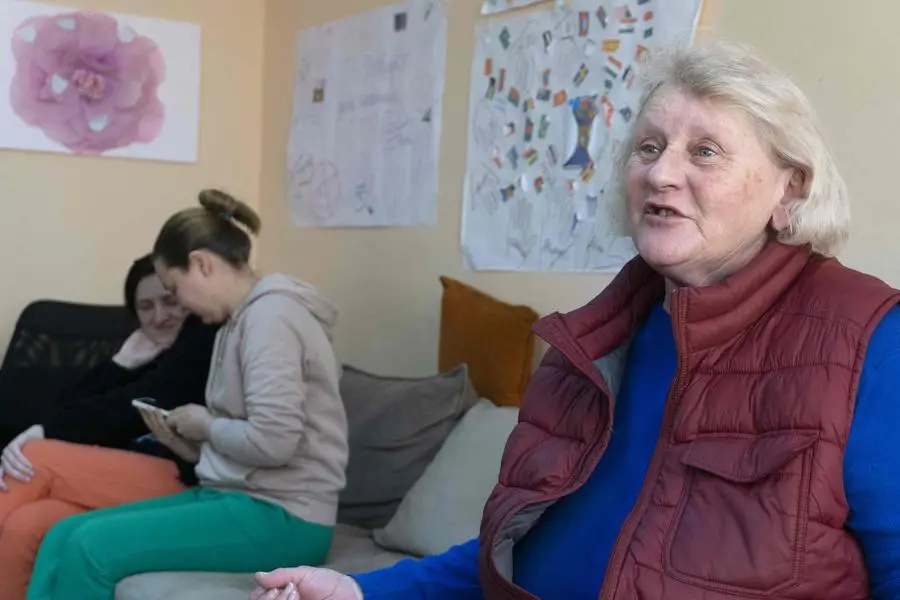PHOTO
Tatiana Bellayar was among tens of thousands of Ukrainians who fled Russia's invasion a year ago, rushing to find a safe haven by crossing into tiny, impoverished neighbour Moldova.
The nation, one of the poorest in Europe, ended up becoming one of the largest recipients per capita of Ukrainian refugees despite being buffeted by its own crises even before the war.
"Here, we are provided with everything we need and... the sky is peaceful, we are not afraid for our children" said Bellayar, 62, who fled with her daughter and two-year-old granddaughter.
Yet the arrival of some 100,000 Ukrainians to the country of about 2.6 million has brought new attention and a push for resources to crisis-battered Moldova.
Twenty percent of its population lives below the poverty line and the former Soviet republic has seen a massive exodus, which has worsened over the past ten years.
Inflation currently hovers around 27 percent after it peaked at more than 34 percent in August.
"The priority now is to help the country progress economically, because it was already a fragile environment" a year ago, said Francesca Bonelli, United Nations High Commissioner for Refugees representative in Moldova.
As time goes on, "the situation becomes more difficult because the inhabitants feel forgotten and begin to see the refugees as a problem," Bonelli added.
Only if humanitarian aid "benefits both the refugees and the local community" in bolstering hospitals, border protection and ministries, "will solidarity last over the long term," she noted.
The arrival of thousands of additional people in a nation with an already "strained public health system" further boosts demand, Doctors of the World coordinator in Moldova Liz Devine said.
"Imagine if three million people were to arrive in France and they needed medical services overnight," she said, to illustrate Moldova's situation.
About 40 NGOs are present in Moldova, in addition to the five United Nations agencies.
"When the war began and the refugees started arriving, we immediately set everything in motion and offered our resources," said Eduard Tatarov, head of a refugee centre accommodating Ukrainians.
Tatarov oversees a boarding school that also serves as an accommodation centre in Nisporeni about 75 kilometres (45 miles) west of the capital Chisinau.
Bellayar, who fled her home near Odessa, lives with 54 other Ukrainians and 160 students of the nearby vocational school, they live at the centre.
"I chose Moldova because it is not very far from my village and I hope to return as soon as possible," she said.
Despite being homesick, Bellayar expresses constant gratitude to Moldova for allowing her to live without fear that her family would be harmed.
Pro-Western Moldova, wedged between Ukraine and Romania, became independent from the Soviet Union in 1991.
The country has two breakaway regions -- Transnistria bordering Ukraine and Gagauzia in the south, which both seceded in the 1990s.
While Gagauzia hosts a Turkish minority, separatist Transnistria is populated by Russian speakers and Moscow's 1,500 soldiers still deployed there, repeatedly fuelling fears of an invasion.
NGOs such as Solidarites International also try to chip in by granting contributions of around 35 euros ($37) per family per month to the many Moldovans who have welcomed Ukrainian refugees into their homes.
Even before the war, Moldova suffered an "energy crisis which began in 2021, the impact of Covid, and last year's drought affecting its agriculture," said SI field coordinator Serge Gruel.
The "country has been trying to get out of it for a few years" but then suffered "several successive shocks", he added.
Nonetheless, 60-year-old Moldovan Raissa Ulinichi has taken in Ukrainian refugees in her house on the outskirts of Chisinau.
"Of course there are more expenses. Before I lived alone and now there are four of us," she said while playing cards with her new housemates. "But life goes on."
sc-crb/anb/kym/cw/jmm





















